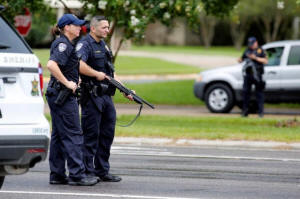|
Baton Rouge: A city divided between
police and the policed
 Send a link to a friend
Send a link to a friend
 [July 18, 2016]
By Lawrence Hurley and Chris Prentice [July 18, 2016]
By Lawrence Hurley and Chris Prentice
(Reuters) - Before the killing of three law
enforcement officers on Sunday and the fatal shooting of a black man by
police earlier this month, Baton Rouge was a city divided between the
police and the policed.
Tensions in Louisiana's state capital go back years. For many residents,
the police force has been viewed as overly aggressive and
unrepresentative of a city where over half the 230,000 residents are
black and where racial problems date back decades.
Minorities are "very wary of police and often afraid of them," says
Michele Fournet, a veteran Baton Rouge criminal defense lawyer.
It was unclear whether there was a link between Sunday's shootings and
the recent unrest over the police killings of black men in Baton Rouge
and Minnesota. Police told CNN the shootings on Sunday did not appear to
be race-related.
Officers were responding to a call of shots fired when they were shot in
what Baton Rouge Mayor Kip Holden described as "an ambush-style deal."
Three officers were killed and three others wounded. The gunman is dead.
"It is unspeakable that these men risking their lives to protect and
serve this community were taken out the way that they were," Louisiana
Governor John Bel Edwards told a news briefing.

"The hatred just has to stop," he said.
Baton Rouge has been one of America's most crime-plagued cities. In
2015, it had 60 homicides, 98 rapes and 809 robberies, among the highest
rates of violent crime for a U.S. city of its size.
In recent years, local activists have urged law enforcement to spend
more time in neighborhoods as part of "community policing."
Many would also like the city to hire more black officers.
Last month, the city's police department held a second "summer camp day"
with local children, which was seen by some residents as an effort to
improve relations with the community.
Baton Rouge Police Chief Carl Dabadie Jr. "wanted the community to be
able to interact with the police in a positive manner," said Simone
Higginbotham, a 45-year-old resident who publishes a free, local
magazine.
"He wanted to go back to the times when kids wanted to grow up and
become police officers."
Calls for community policing have been growing across the country since
the 2014 police shooting of black teenager Michael Brown by a white
officer in Ferguson, Missouri.
A wave of anti-police protests has spread, fueled by a series of fatal
encounters between police and members of minority groups.
CONSENT DECREE
A Baton Rouge police spokesmen said the department had made significant
strides toward improving diversity on its force.
[to top of second column] |

Law enforcement officers block Airline Highway near the site of a
shooting of police in Baton Rouge, Louisiana, United States, July
17, 2016. REUTERS/Joe Penney

In 1980, when Baton Rouge was put under a federal consent decree to
improve its minority recruiting, about 10 percent of the
departmentís 516 employees were black. As of June this year, 201 of
657 officers are black, or 30 percent, according to police
department data.
Blacks made up about 55 percent of Baton Rougeís population in 2010,
according to U.S. government data.
Alton Sterling, the Baton Rouge man whose shooting death at the
hands of police on July 5 triggered protests across the country, had
peddled CDs for years, and law enforcement officers would have known
he was not a threat if they were more familiar with the area, local
residents said.
One officer is notorious for harassing local black residents to the
point where he has been given a street nickname of "Bro Stupid,"
said Burnell Williams, who works with at-risk youth and ex-prisoners
for the nonprofit group Against All Odds.
Michael Mitchell, 33, a motivational speaker and minister who lives
near the store where Sterling was killed, said relations had long
been strained between the police and the neighborhood.
"It added a match to fuel that was already there," he said.
In Dallas, where five police officers were killed on July 7 during
an otherwise peaceful protest over the Louisiana and Minnesota
shootings, Police Chief David Brown told reporters that community
policing was the best way to deter crime and protect officers.

Brown, a 33-year department veteran, noted that 2015 was the 12th
year of crime reduction in Dallas, more than any other major
American city.
Police "have done this by also protecting the civil rights of our
citizens," Brown said.
(Reporting by Lawrence Hurley in Washington and Chris Prentice in
New York; Additional reporting by Letitia Stein in Baton Rouge, La.;
Editing by Jason Szep, Peter Cooney and Paul Simao)
[© 2016 Thomson Reuters. All rights
reserved.]
Copyright 2016 Reuters. All rights reserved. This material may not be published,
broadcast, rewritten or redistributed. |